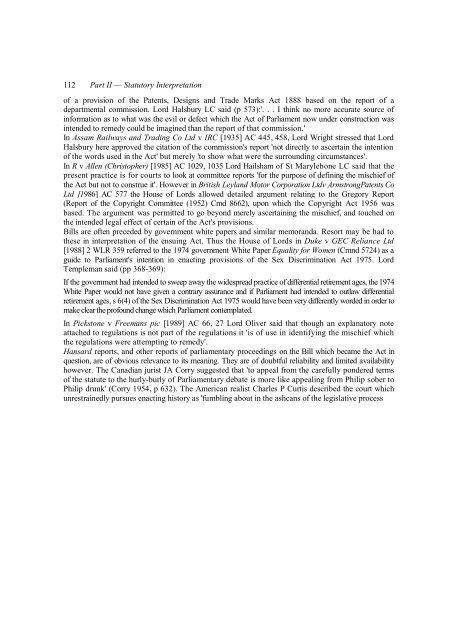Statutory Interpretation The Technique of Statutory ... - Francis Bennion
Statutory Interpretation The Technique of Statutory ... - Francis Bennion
Statutory Interpretation The Technique of Statutory ... - Francis Bennion
Create successful ePaper yourself
Turn your PDF publications into a flip-book with our unique Google optimized e-Paper software.
112 Part II — <strong>Statutory</strong> <strong>Interpretation</strong><br />
<strong>of</strong> a provision <strong>of</strong> the Patents, Designs and Trade Marks Act 1888 based on the report <strong>of</strong> a<br />
departmental commission. Lord Halsbury LC said (p 573):'. . . I think no more accurate source <strong>of</strong><br />
information as to what was the evil or defect which the Act <strong>of</strong> Parliament now under construction was<br />
intended to remedy could be imagined than the report <strong>of</strong> that commission.'<br />
In Assam Railways and Trading Co Ltd v IRC [1935] AC 445, 458, Lord Wright stressed that Lord<br />
Halsbury here approved the citation <strong>of</strong> the commission's report 'not directly to ascertain the intention<br />
<strong>of</strong> the words used in the Act' but merely 'to show what were the surrounding circumstances'.<br />
In R v Allen (Christopher) [1985] AC 1029, 1035 Lord Hailsham <strong>of</strong> St Marylebone LC said that the<br />
present practice is for courts to look at committee reports 'for the purpose <strong>of</strong> defining the mischief <strong>of</strong><br />
the Act but not to construe it'. However in British Leyland Motor Corporation Ltdv ArmstrongPatents Co<br />
Ltd [1986] AC 577 the House <strong>of</strong> Lords allowed detailed argument relating to the Gregory Report<br />
(Report <strong>of</strong> the Copyright Committee (1952) Cmd 8662), upon which the Copyright Act 1956 was<br />
based. <strong>The</strong> argument was permitted to go beyond merely ascertaining the mischief, and touched on<br />
the intended legal effect <strong>of</strong> certain <strong>of</strong> the Act's provisions.<br />
Bills are <strong>of</strong>ten preceded by government white papers and similar memoranda. Resort may be had to<br />
these in interpretation <strong>of</strong> the ensuing Act. Thus the House <strong>of</strong> Lords in Duke v GEC Reliance Ltd<br />
[1988] 2 WLR 359 referred to the 1974 government White Paper Equality for Women (Cmnd 5724) as a<br />
guide to Parliament's intention in enacting provisions <strong>of</strong> the Sex Discrimination Act 1975. Lord<br />
Templeman said (pp 368-369):<br />
If the government had intended to sweep away the widespread practice <strong>of</strong> differential retirement ages, the 1974<br />
White Paper would not have given a contrary assurance and if Parliament had intended to outlaw differential<br />
retirement ages, s 6(4) <strong>of</strong> the Sex Discrimination Act 1975 would have been very differently worded in order to<br />
make clear the pr<strong>of</strong>ound change which Parliament contemplated.<br />
In Pickstone v Freemans pic [1989] AC 66, 27 Lord Oliver said that though an explanatory note<br />
attached to regulations is not part <strong>of</strong> the regulations it 'is <strong>of</strong> use in identifying the mischief which<br />
the regulations were attempting to remedy'.<br />
Hansard reports, and other reports <strong>of</strong> parliamentary proceedings on the Bill which became the Act in<br />
question, are <strong>of</strong> obvious relevance to its meaning. <strong>The</strong>y are <strong>of</strong> doubtful reliability and limited availability<br />
however. <strong>The</strong> Canadian jurist JA Corry suggested that 'to appeal from the carefully pondered terms<br />
<strong>of</strong> the statute to the hurly-burly <strong>of</strong> Parliamentary debate is more like appealing from Philip sober to<br />
Philip drunk' (Corry 1954, p 632). <strong>The</strong> American realist Charles P Curtis described the court which<br />
unrestrainedly pursues enacting history as 'fumbling about in the ashcans <strong>of</strong> the legislative process

















